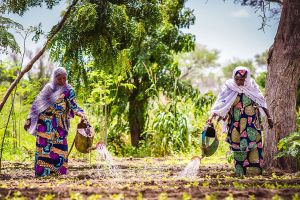Investments in global food security alleviate poverty, spur economic growth, promote social stability, and enhance the resilience of communities in low-income regions of the world.
Key Findings
Research suggests that investments in global food security alleviate poverty, spur economic growth, promote social stability, and enhance the resilience of communities and countries in low-income regions of the world.
US investments in global food security have been largely successful in supporting development while fostering strategic relationships and positioning American businesses to take advantage of markets of growth.
In spite of these efforts—and strong evidence of their impacts—it is challenging to evaluate how global food security funds are being invested because of outdated definitions and opaque budgeting practices. This will become increasingly problematic as policymakers evaluate the effectiveness of investments and the need to sustain them over the long term.
This paper lays out what is known about current US investments in global food security and makes recommendations for how to clarify and track investments across a range of agencies, with the goal of strengthening America's commitment to alleviating hunger and spurring agriculture and food system growth over the long term.
Currently, four challenges are making it difficult to evaluate US investments:
- There is no unanimous view on which US investments and activities contribute to global food security. For example, some stakeholders focus exclusively on Feed the Future, while others devote attention primarily to food aid. Investments in agricultural research and international post-conflict reconstruction are almost never discussed. An updated definition that takes into account the range and interconnected nature of investments related to global food security is needed.
- Although Feed the Future attempts to utilize a "whole-of-government" approach by coordinating the entirety of US government agencies engaged in food security, the role of different agencies and mechanisms for collaboration are opaque, making it difficult to leverage strengths across the government. Agencies are also defining "global food security" and "global agricultural development" differently, making it challenging to track investments.
- Within Feed the Future it is difficult to identify which transformative investments should be scaled up because it is unclear how some global food security funds are being directed.
- Details on funding for improved nutrition, a necessary and increasingly recognized aspect of global food security, are unclear, making it difficult to craft effective, cross-sectoral interventions.
To address these challenges, The Chicago Council recommends the following:
- Recommendation 1—Global food security assistance should be consistently defined as funds directed towards agricultural development, nutrition interventions, food aid, and agriculture and food research.
- Recommendation 2—The US government should provide a more detailed accounting of how Feed the Future and nutrition monies are being spent.
- Recommendation 3—The US government should better leverage the strengths of federal agencies and assign clear agency roles and responsibilities. Members of Congress should consider legislatively strengthening coordination and consultation between the 11 agencies involved in global food security activities, especially between the US Agency for International Development (USAID) and the US Department of Agriculture (USDA) on the Feed the Future research strategy and food aid initiatives.
- Recommendation 4—Congress should provide leadership by authorizing a long-term commitment to global food security.

